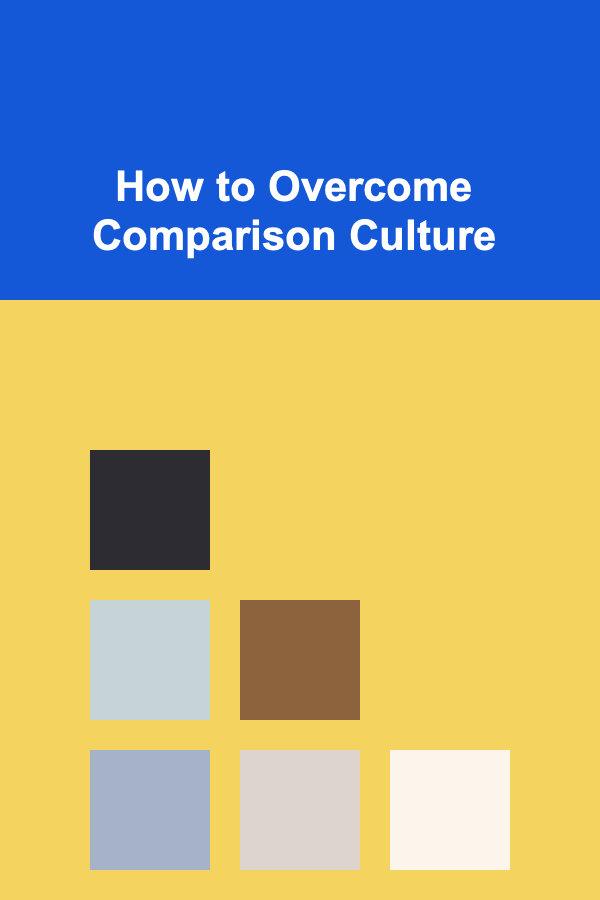
How to Overcome Comparison Culture
ebook include PDF & Audio bundle (Micro Guide)
$12.99$6.99
Limited Time Offer! Order within the next:

In today's world, where social media dominates and everyone seems to be competing for attention, the culture of comparison has become a prominent part of our lives. We constantly measure ourselves against others---whether it's about achievements, looks, social status, or possessions. This obsession with comparing ourselves to others is often harmful and can result in feelings of inadequacy, jealousy, or anxiety. But the truth is, overcoming comparison culture is not only possible; it's essential for leading a fulfilling and healthy life. In this article, we'll explore the nature of comparison, the dangers it brings, and actionable strategies to break free from this cycle.
Understanding the Nature of Comparison
Comparison has been a part of human nature for centuries. As social creatures, we've always gauged our worth in relation to others. In the past, comparison was often about survival---how much food or land we had compared to others in the tribe. In today's world, the parameters of comparison have expanded to virtually every aspect of life, from careers to personal relationships and even physical appearance. This creates a pressure to "measure up" to the seemingly perfect lives others are portraying.
The Social Media Impact
Social media platforms like Instagram, Facebook, Twitter, and TikTok have amplified comparison culture. Everyone has a platform to share their curated, idealized versions of their lives, and we, as consumers of these posts, often fall into the trap of comparing their highlight reels to our behind-the-scenes moments.
While it's true that social media can connect us with people, share knowledge, and provide entertainment, it also fosters a sense of inadequacy. People post only their best photos, achievements, vacations, and experiences, which are then showcased in such a way that makes them seem far more glamorous or enviable than they are in reality. The result is an endless cycle of feeling like we need to keep up or do better.
Evolutionary Roots of Comparison
It's important to note that the instinct to compare is rooted in our evolutionary psychology. Humans have always relied on their social group to survive. Early humans compared themselves to others in terms of strength, intelligence, and social standing in order to secure a place in the group. Today, although our survival no longer depends on these comparisons, we still carry this instinct with us, and in the modern world, it's often directed toward wealth, fame, beauty, and success.
The Dangers of Comparison
While comparison can sometimes serve as a motivator, more often than not, it leads to negative emotions. Here are some of the major dangers that arise from comparison culture:
1. Decreased Self-Esteem
The most obvious danger of comparison is its negative impact on self-esteem. When we compare ourselves to someone who appears to be more successful, attractive, or accomplished, we are more likely to feel inadequate or inferior. This is especially true when we compare our behind-the-scenes to others' highlight reels. The result is a distorted perception of our own worth, leading to self-doubt, insecurity, and a reduced sense of self-value.
2. Anxiety and Stress
Comparison often leads to anxiety and stress because it creates a constant sense of competition. We start to believe that we're not doing enough or achieving enough. This pressure can lead to burnout, exhaustion, and an overwhelming fear of failure. The more we compare, the more we amplify these feelings, leading to a vicious cycle of stress.
3. Envy and Jealousy
Another negative emotion that arises from comparison is jealousy. When we focus on what others have---whether it's material possessions, success, or relationships---we feel a sense of lack. This can lead to envy, which only breeds negative feelings toward others and can damage our relationships. Rather than feeling happy for someone else's success, we might feel resentful or bitter.
4. Loss of Authenticity
Constantly comparing ourselves to others can lead to a loss of authenticity. We may start to mold ourselves into the image of someone we admire or envy, sacrificing our true selves in the process. The more we compare, the more we focus on trying to fit into external standards of success, beauty, or social status, rather than cultivating our own values and individuality.
5. Impaired Relationships
Comparison doesn't just affect our relationship with ourselves---it also impacts how we relate to others. When we're consumed by comparison, we may start to see our friends, family, and colleagues as competitors rather than allies. This can lead to feelings of resentment, jealousy, or even isolation. Over time, it can damage our support networks and weaken our social bonds.
Strategies to Overcome Comparison Culture
While comparison culture is pervasive, there are several actionable strategies we can implement to break free from its grasp. Overcoming comparison requires both mental shifts and behavioral changes. Here are some effective ways to overcome comparison culture and reclaim your self-worth.
1. Practice Self-Awareness
The first step in overcoming comparison is to become aware of it. Pay attention to when and how often you compare yourself to others. Are you scrolling through social media and feeling envious of someone else's life? Are you measuring your success based on others' achievements? Identifying these moments is crucial in gaining control over them. Once you're aware of the comparison, you can start to question its validity and relevance to your own life.
2. Limit Social Media Consumption
One of the most effective ways to reduce comparison is to limit your exposure to social media. Social media platforms are specifically designed to encourage comparison, with algorithms that prioritize posts that evoke strong emotions, including envy. By cutting down on your time spent on social media or following accounts that make you feel inadequate, you can reduce the constant influx of comparison triggers.
Another useful tip is to curate your social media feed to include accounts that inspire and uplift you. Follow people who promote positivity, self-improvement, and authenticity, rather than those who focus on superficial metrics like followers or material wealth.
3. Reframe Your Mindset
Changing how we view comparison is crucial. Instead of viewing someone else's success as a threat to your own, start reframing your mindset. See others' accomplishments as a source of inspiration rather than something that diminishes your own worth. When you admire someone, use it as motivation to learn, grow, and improve yourself. Embrace the idea that success is not limited---there's enough room for everyone to succeed in their own way.
Additionally, practice gratitude for what you have. Rather than focusing on what others have that you don't, take time each day to reflect on your own blessings. This shift in perspective can help you cultivate contentment and reduce the urge to compare.
4. Focus on Your Own Journey
The most important thing to remember is that everyone is on a unique journey. Comparing your path to someone else's is like comparing apples to oranges---it's not an accurate or fair comparison. Your experiences, struggles, and successes are all part of your individual story.
Focus on your own growth, rather than measuring yourself against others. Set personal goals based on your values and desires, not what others are doing. Celebrate your achievements, no matter how small they may seem. When you focus on your personal progress, the need to compare with others naturally fades away.
5. Embrace Imperfection
No one's life is perfect, despite what social media may portray. People's successes are often the result of years of hard work, failure, and perseverance. Embrace the fact that imperfection is part of being human. We all have flaws, weaknesses, and setbacks, but these don't diminish our worth. When you accept your imperfections and view them as opportunities for growth, you free yourself from the need to constantly compare.
6. Cultivate Self-Compassion
Finally, practice self-compassion. Be kind to yourself, especially when you catch yourself comparing. Instead of criticizing yourself for not measuring up to someone else, treat yourself with the same kindness and understanding you would offer a friend. Understand that it's okay to have setbacks, to not have everything figured out, and to make mistakes. Self-compassion helps to reduce the negative self-talk that often accompanies comparison.
7. Seek Professional Help if Needed
If you find that comparison is significantly affecting your mental health, it may be helpful to seek professional guidance. A therapist or counselor can help you explore the underlying causes of your comparison habits and provide strategies to address them. Therapy can also help you address deeper issues like low self-esteem or anxiety that may be exacerbated by comparison.
Conclusion
The culture of comparison is a pervasive issue in modern society, fueled by social media and our natural instincts. However, it's possible to break free from this cycle by becoming aware of when we compare, reframing our mindset, limiting social media exposure, focusing on our own unique journeys, and practicing self-compassion. By making these changes, we can reclaim our self-worth and lead more authentic, fulfilling lives. Remember, the only person you need to compare yourself to is the person you were yesterday. Keep growing, keep evolving, and embrace your own path without the pressure to measure up to anyone else.

How to Maintain a High Standard of Cleanliness and Hygiene
Read More
How to Use Security Signs and Decals to Deter Criminals
Read More
How to Optimize AR Performance
Read More
How To Lead a Successful Remote Team
Read More
Designing a Playroom: Creating a Fun and Tidy Space
Read More
10 Tips for Retiring Early with a Personal Finance Planner's Help
Read MoreOther Products

How to Maintain a High Standard of Cleanliness and Hygiene
Read More
How to Use Security Signs and Decals to Deter Criminals
Read More
How to Optimize AR Performance
Read More
How To Lead a Successful Remote Team
Read More
Designing a Playroom: Creating a Fun and Tidy Space
Read More